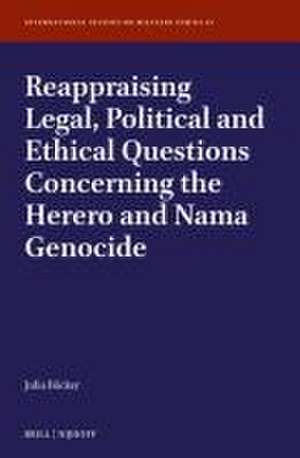Reappraising Legal, Political and Ethical Questions Concerning the Herero and Nama Genocide: International Studies on Military Ethics, cartea 13
Autor Julia Franziska Maria Böckeren Limba Engleză Hardback – 28 feb 2024
Preț: 517.62 lei
Preț vechi: 608.96 lei
-15% Nou
Puncte Express: 776
Preț estimativ în valută:
99.06€ • 102.33$ • 82.44£
99.06€ • 102.33$ • 82.44£
Carte disponibilă
Livrare economică 06-12 martie
Preluare comenzi: 021 569.72.76
Specificații
ISBN-13: 9789004688193
ISBN-10: 9004688196
Dimensiuni: 155 x 235 mm
Greutate: 0.33 kg
Editura: Brill
Colecția Brill | Nijhoff
Seria International Studies on Military Ethics
ISBN-10: 9004688196
Dimensiuni: 155 x 235 mm
Greutate: 0.33 kg
Editura: Brill
Colecția Brill | Nijhoff
Seria International Studies on Military Ethics
Notă biografică
Julia Böcker, is a peace educator and mediator. She studied history and international law (MA) and peace & security studies (MPS). After chapters in Switzerland, Israel and the USA, she works for the Center of Ethical Education in the Armed Forces in Hamburg, Germany. Dealing with the past is a main focus of her research interest.
Cuprins
Preface
Acknowledgements
List of Maps
1Introduction
1 Starting Position: Diagnosing the Problem
2 Enquiry/Key Questions, Aims, Research Hypotheses
3 Methodical Approach and Structure of This Paper
4 Sources and Current State of Literature and Research
5 Political and Scientific Relevance of This Paper
2Historical Background Genocide in the Colony
1 Colonial Rule in German South West Africa
2 Eroding the Limits of Violence in War (1904 to 1908)
3 Concentration Camps and Forced Labour
4 Consequences in the Resent
3On Legal Reappraisal Category Genocide
1 A Crime against Human Rights?
2 Answers Derived from Genocide Research
3 Judicial Reappraisal of the Colonial Injustice
4Approaches of Political Reappraisal
1 Forgetting, Suppressing, Avoiding
2 Development Aid as Compensation?
3 The ‘G-Word’ and Breaking Taboos
4 Politicising Colonial Injustice
5 German-Namibian Talks
5An Ethical and Moral Approach The Way of Apology
1 Requirements of a Political Apology
2 2004 Memorial Ceremony on the Waterberg – ‘Forgive Us Our Trespasses’
3 Non-political Apologies
4 Impetus from Political Actors
5 Prospects of a Plea for Forgiveness
Conclusion
1 Summary
2 Policy Recommendation
3 Other Means of Reappraisal
4 Outlook
Afterword
Appendix
Sources and Literature
Acknowledgements
List of Maps
1Introduction
1 Starting Position: Diagnosing the Problem
2 Enquiry/Key Questions, Aims, Research Hypotheses
3 Methodical Approach and Structure of This Paper
4 Sources and Current State of Literature and Research
5 Political and Scientific Relevance of This Paper
2Historical Background Genocide in the Colony
1 Colonial Rule in German South West Africa
2 Eroding the Limits of Violence in War (1904 to 1908)
3 Concentration Camps and Forced Labour
4 Consequences in the Resent
3On Legal Reappraisal Category Genocide
1 A Crime against Human Rights?
2 Answers Derived from Genocide Research
3 Judicial Reappraisal of the Colonial Injustice
4Approaches of Political Reappraisal
1 Forgetting, Suppressing, Avoiding
2 Development Aid as Compensation?
3 The ‘G-Word’ and Breaking Taboos
4 Politicising Colonial Injustice
5 German-Namibian Talks
5An Ethical and Moral Approach The Way of Apology
1 Requirements of a Political Apology
2 2004 Memorial Ceremony on the Waterberg – ‘Forgive Us Our Trespasses’
3 Non-political Apologies
4 Impetus from Political Actors
5 Prospects of a Plea for Forgiveness
Conclusion
1 Summary
2 Policy Recommendation
3 Other Means of Reappraisal
4 Outlook
Afterword
Appendix
Sources and Literature











